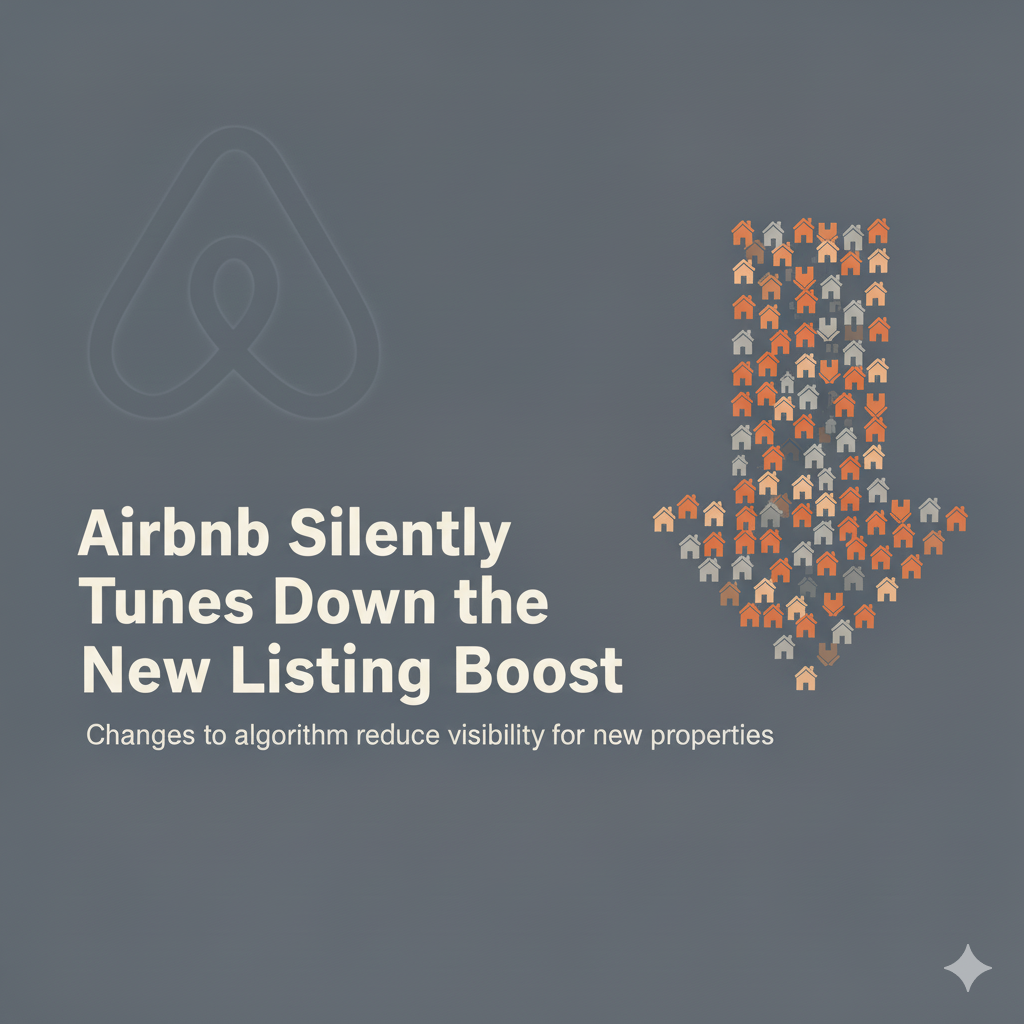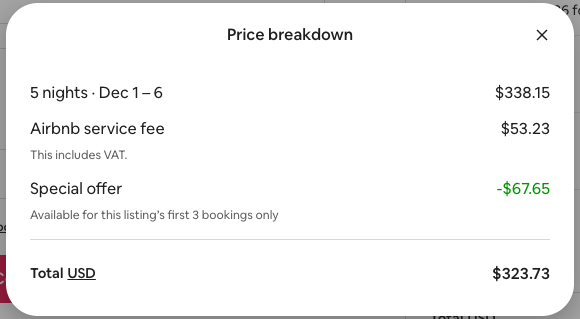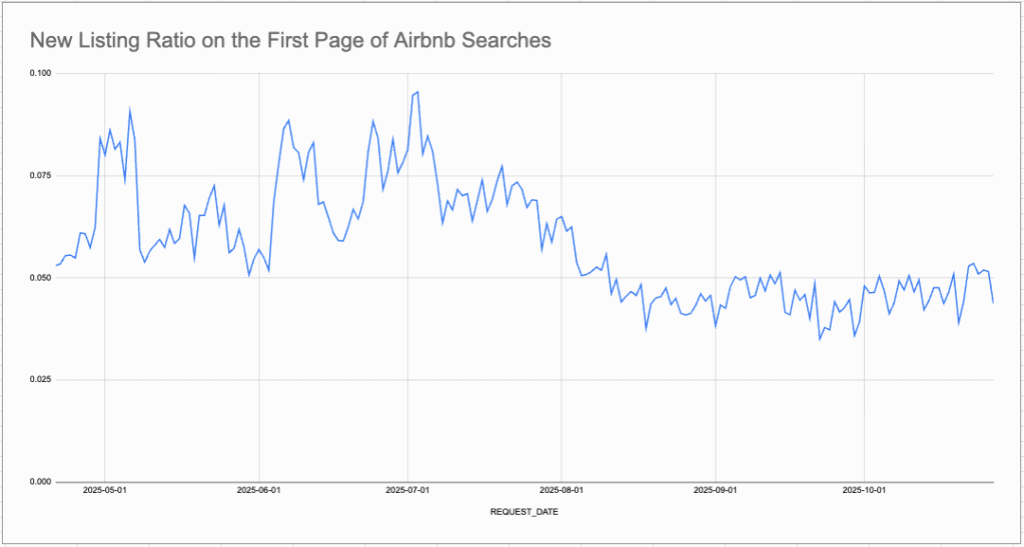Did Airbnb Silently Tune Down the New Listing Boost?

Do you remember those days when you opened a new Airbnb listing and got reservations right away?
If you’re one of those hosts who doesn’t feel it’s the same anymore, you’re absolutely not alone. The internet is full of new hosts struggling to get their first-ever bookings in a saturated market full of listings with hundreds of glowing reviews.
So how do you compete in such a landscape?
For a new listing on Airbnb with no reviews, you have to rely on the Airbnb algorithm. If rankings were based purely on reviews and price, you’d have almost zero chance. That’s why the Airbnb new listing boost exists but it’s not a gift.
As a marketplace, Airbnb needs both guests and hosts to thrive. Giving new hosts a fair chance to stand out works in their favor too. To grow the supply side, they must give newcomers that joy of receiving their first booking notification that “you’ve got a reservation!” moment we all love.
But many hosts claim Airbnb isn’t boosting new listings like it used to, especially after the Airbnb 2025 Summer Release. At Homesberg, we feel that too — and we’re here to prove it with our data.
Before diving in, let’s briefly touch base on what the Airbnb new listing boost really is.

What Is Airbnb’s New Listing Boost?
Each new listing entering the Airbnb marketplace receives a temporary visibility boost designed to help it survive in a competitive environment. You’ll appear higher in search results for a limited time before competition normalizes.
This short window is your opportunity to shine and position your listing competitively before that boost fades and you must rely on your reviews and pricing power alone.

What Is Airbnb’s New Listing Promotion?
The Airbnb new listing promotion is a separate feature. When you opt in to a 20% discount for your first three reservations, Airbnb claims to promote your listing through email campaigns and internal placements (though let’s be honest, who really books through newsletters?).
It’s generally smart to price your listing competitively at launch since you have no social proof. However, if you know your market, understand your competition, and have confidence in your value, you can skip this feature.
If you still decide to use the Airbnb new listing promotion, take the following into serious consideration:
Things to Care About When Using Airbnb’s New Listing Promotion
Your main goal at the beginning of your hosting journey is to get at least three 5-star reviews as soon as possible. Avoid anything that prolongs the process or costs more than it should.
- Be careful with weekly and monthly discounts – they stack with the new listing promotion.
- Focus on the near future; raise your prices gradually after 30–60 days.
- Cap your maximum stay length – don’t risk a 45-day stay at a 20% discount.
- Provide an excellent stay to secure those first 5-star reviews.
- Fake reviews? Let’s just say it’s a riskier and more common practice than it seems.
Is Airbnb’s New Listing Boost Gone in 2025?
Short answer: No, it’s not gone but according to Homesberg data, the Airbnb new listing boost has been significantly tuned down.
Airbnb still needs to support the supply side of the marketplace but not as urgently as before.
Airbnb New Listing Boost 2025: Data and Methodology
We analyzed 85,000 first-page searches over 189 days from April 21, 2025 to October 27, 2025 across various global markets. That’s roughly 450 searches per day. We then compared the ratio of listings with no ratings (<3 reviews) across this period to measure how visible new listings were in search results.
Here’s what the data shows:

From April 21 to mid-July, an average of 6.6% of first-page listings were new. Since there are 18 listings per page, that’s roughly 1 new listing per page.
From mid-July onward, the share of new listings declined steadily and stabilized around 3.3% by mid-August.
In other words, new listings now appear half as often on the first page as they did earlier in the year. It seems Airbnb has quietly halved the new listing boost without any official announcement.
Why Did Airbnb Reduce the New Listing Boost? (Opinion)
Airbnb used to exercise two-sided marketing, appealing equally to hosts and guests. However, that balance has shifted in recent years, leaning heavily toward guests as the supply side became saturated and professionalized. (See our related post on Airbnb’s silent battle against large-scale property managers.)
Airbnb began with a noble cause: enabling locals to earn extra income while offering unique guest experiences. But as the platform matured, it evolved. Hosting became a full-time career, investors entered for ROI, and large portfolios dominated markets.
In 2024, Airbnb provided 61 nights per listing per year across its 8 million listings, while Booking.com averaged 133 nights for its 2.9 million listings. (See our blog post comparing Airbnb vs Booking.com for more details.)
As other OTAs gained ground in the vacation rental space and global supply increased, Airbnb shifted focus toward the demand side – retaining existing guests and acquiring new ones.
You can feel this shift by simply browsing Airbnb hosting communities: host frustration is everywhere from refunds and reviews to algorithm visibility and customer service complaints.
At the same time, Airbnb faces pressure to cut costs and improve profit margins to appeal to investors. The company’s share price remains about 10% below its IPO level after five years. One obvious way to cut overhead is reducing customer support costs by leaning more on proven, professional hosts while automating risk-prone areas with AI review review systems and algorithmic guest-host matching.
All signs point to an algorithm tuned for reliability and consistency, not experimentation and that means a weaker Airbnb new listing boost.
What Hosts Can Do to Make Their New Listing Take Off
The Airbnb algorithm changes frequently, sometimes announced, sometimes not. But the fundamentals of success haven’t changed much. They’ve just become harder to achieve.
The path to success for any host still follows the same pattern:
1. Get Reservations
You need to start the engine. Appeal to potential guests, respond quickly, and convert inquiries into bookings.
Focus on:
- Preparing a quality space with in-demand amenities
- Getting professional interior photography
- Writing a clear, compelling title and description
- Responding fast to inquiries
- Pricing your listing competitively (especially early on)
2. Get 5-Star Reviews
Once you have bookings, your priority is to ensure perfect stays and earn great, lengthy reviews. These are your long-term visibility drivers.
Focus on:
- Sparkling cleanliness
- Smooth check-in and check-out
- Being available when needed
- Politely asking for reviews (anything below 5 stars hurts early growth)
3. Repeat and Grow
Make it a loop. Every satisfied guest increases your visibility, helping you move beyond any algorithmic boost.
Once you’ve established a solid review base, start optimizing pricing. Use tools like Homesberg to track your Airbnb ranking, monitor Airbnb algorithm changes, and adjust your prices dynamically to maximize revenue.
Key takeaway
The Airbnb new listing boost may not be gone but it’s weaker than before. The best-performing hosts in 2025 will be those who no longer depend on algorithmic favors, but instead build their own momentum through data-driven visibility and pricing strategies.
About Homesberg
Your ranking changes with the algorithm. Improve your strategy by knowing exactly where you stand and what affects your visibility. With Homesberg, you can track and optimize easily.
Homesberg is an all-in-one vacation rental management platform built around the must-have features hosts truly need: self-reliant market data collection, an Airbnb ranking tracker, a robust dynamic pricing engine, and seamless integrations with all major channels. No more juggling multiple tools or paying for underutilized features.
